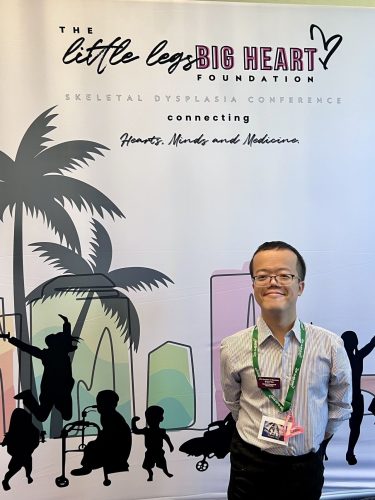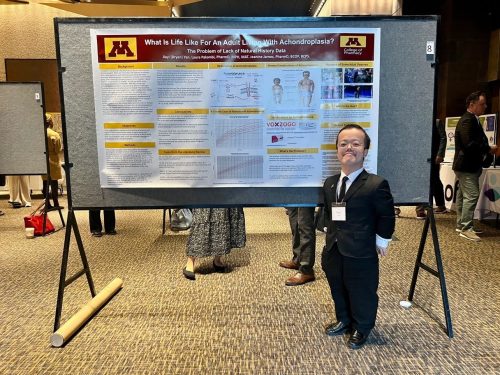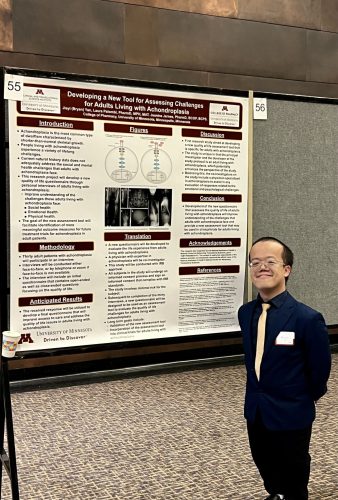Jiayi (Bryan) Yan
“I really felt a personal calling to dedicate myself to research, to work toward better treatments for adults, and to help with the challenges they face every day.”
Every life is molded by unique experiences, but for Bryan Yan, it is his difference that defined not only his life, but his path and purpose. Born with achondroplasia and the only little person in his family, Bryan mentions he “learned early on what made him different”. According to the National Organization for Rare Disorders, achondroplasia occurs in approximately 1 in 20,000–30,000 births and is caused by a change in the FGFR3 gene, responsible for regulating bone growth at cartilage growth plates1. For Bryan, he has been “adversely affected both physically and psychologically” from achondroplasia throughout his whole life. Bryan notes, “it is important to know that achondroplasia involves not only physical differences, such as short body stature and malformed limbs, but also psychological challenges like bias, discrimination and social isolation from peers.”
From a young age, Bryan became familiar with the feelings of being misinterpreted and not fully seen for all that he is — both within his personal circle and broader communities, such as in academic and professional settings. As he grew older, being frequently perceived through others’ assumptions became an increasingly common occurrence. Those early experiences of marginalization, continuing to emerge into his adulthood, fueled his desire to bring both visibility and equity to adults living with achondroplasia.
The limited awareness surrounding adults with achondroplasia extends into the medical world because, while significant advances have been made for children, including an FDA-approved treatment, adults like Bryan remain largely overlooked. In 2021, the FDA approved Voxzogo® (vosoritide), a type-C natriuretic peptide that can increase height in children with achondroplasia. However, there is little to no information on the efficacy of any drugs for adults2. The lack of treatment options for adults mirrors the broader gap in representation adults with achondroplasia face. Determined to address these disparities, Bryan set his sights on earning a PharmD at the University of Minnesota and pursuing his own research dedicated to making a positive impact on available treatment options and a greater awareness within his community.

Bryan’s journey in research and advocacy began during his second year of pharmacy school. During that time, he had experienced rejection and marginalization from many peers, incidents that left him feeling isolated and disheartened, particularly within a professional setting. This became a turning point for Bryan and instead of letting the discouragement hold him back, he transformed the experience into purposeful action. Seeking guidance, he reached out to a faculty mentor at the University of Minnesota who encouraged him to step into the realm of advocacy and ultimately connected him to Engage Health and to the Rare Disease Difference Makers Project®.
By 2024, Bryan was fully emersed into his research and advocacy work while also continuing his PharmD. His focus centers on adults with achondroplasia and the need to address bias and lack of inclusivity in both medicine and everyday life. Through participation in symposiums with his research, “What Is Life Like for An Adult Living with Achondroplasia?” and “Developing a New Tool for Assessing Challenges for Adults Living with Achondroplasia”, Bryan actively contributes to data collection, qualitative analysis, and other research initiatives, all motivated by a vision of equity and respect for others living with his disorder. Bryan believes that adults with achondroplasia are capable and intelligent, deserving of the same encouragement, opportunities, and unity as everyone else – just with a little extra patience and understanding.
Bryan’s lived experience with achondroplasia is deeply intertwined with his academic and professional goals. It has shaped how he views the world around him, not as a limitation, but rather as a perspective that strengthens his empathy, discipline and drive. Being a little person fuels his passion for his research, achondroplasia advocacy, and community building — all allowing him to transform personal experience into meaningful action.


Looking forward, Bryan’s ultimate goal is to foster a world where adults with achondroplasia feel seen, included and supported. He hopes that his research will help dismantle stereotypes and inspire greater compassion, both within and beyond the achondroplasia community. For Bryan, advocacy is not just a research project, but a lifelong commitment where science, awareness and empathy intersect to create lasting change, which is why Engage Health is honored to be featuring him as our latest Rare Disease Difference Maker®.
Bibliography
- Legare, Janet, et al. “Achondroplasia.” National Organization for Rare Disorders, rarediseases.org/rare-diseases/achondroplasia/.
- Legare, Janet, et al. “Achondroplasia – Standard Therapies.” National Organization for Rare Disorders, 2025, rarediseases.org/rare-diseases/achondroplasia/.
